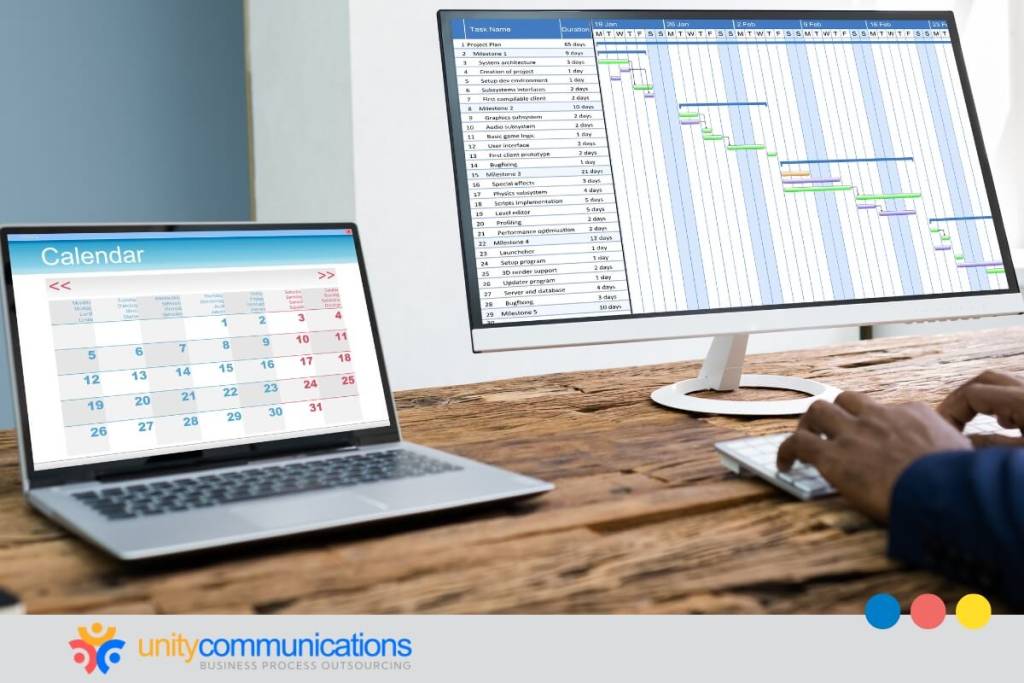IN THIS ARTICLE
Table of Contents
Efficient scheduling ensures that healthcare operations run smoothly and patients receive timely care. However, unpredictable patient needs and last-minute cancellations can hinder efficiency, leading to misallocated resources and long wait times. Inadequate scheduling also results in unattended emergencies and staff unavailability.
Integrating virtual assistants (VAs) into healthcare scheduling has emerged as a practical solution. VAs enhance clinic efficiency and reduce administrative burdens by automating routine tasks and streamlining intricacies.
This article focuses on VAs’ transformative impact on operational effectiveness and patient satisfaction. Keep reading to discover how a virtual medical assistant can improve the efficiency of your scheduling processes.
Enhancing efficiency and accessibility through virtual assistants in healthcare scheduling

Virtual assistants significantly enhance efficiency in healthcare logistics by simplifying the entire scheduling process. VAs take over appointment bookings by identifying available time slots, confirming patient preferences, and sending notifications. They also handle reschedules seamlessly and immediately update patients and providers.
VAs apply these strategies to make scheduling more efficient for practices and accessible to patients:
- Integrate with clinic management systems to synchronize appointment schedules and patient records.
- Utilize chatbots or messaging platforms to manage patient questions and reduce wait times and administrative workload.
- Enhance the schedule accessibility and responsiveness so patients have a more efficient and pleasurable healthcare experience.
- Send reminders and follow-ups to reduce no-show rates and keep patients engaged.
Reliable virtual assistants are often sourced through business process outsourcing (BPO) firms. Contracting third-party teams to manage non-core functions, decrease costs, and increase organizational focus on core activities is what BPO fundamentally is.
How outsourcing works for healthcare logistics is the BPO company integrates VAs into the scheduling process to improve operational efficiency.
Balancing workloads with virtual assistants in healthcare scheduling
Healthcare professionals attend to a high volume of patients, leading to burnout that can impact the practice and the patients. Virtual assistants alleviate this burden by optimizing patient schedules and staff workload.
VAs ensure a balanced workload across multiple practitioners while minimizing gaps and reducing overbooking. They leverage their logistics expertise to effectively manage various provider calendars, considering variables such as appointment types, duration, and individual availability. This precision is crucial for maintaining operational efficiency and patient care.
Suppose a medical practice is hiring a virtual assistant for its Phoenix healthcare organization or Texas clinic. The VA can employ the following scheduling practices to improve workloads among practitioners:
- Align appointments with provider availability.
- Reduce manual scheduling errors through automation.
- Forecast peak times and adjust schedules proactively to manage patient flow.
- Respond quickly to cancellations and reschedule appointments to minimize gaps.
Healthcare workers often have multiple responsibilities in addition to patient care. Outsourcing administrative tasks to healthcare VAs significantly reduces the burden on internal staff.
Healthcare BPO services streamline routine administrative tasks, alleviating the stress that causes employee burnout and improving overall clinic productivity. As such, practitioners can confidently focus on attending to patient needs.
Strengthening patient relationships

A strong relationship between patients and their healthcare providers increases successful treatment outcomes. When patients trust and communicate with their providers, they are more likely to adhere to treatment plans and engage in their healthcare.
Virtual assistants can enhance patient communication to strengthen relationships with healthcare companies and improve satisfaction. They leverage their excellent communication skills and customer service experience to ensure patients receive excellent assistance, especially when scheduling appointments and inquiring about treatments.
Here are the strategies VAs employ to strengthen patient relationships:
- Inform patients of upcoming appointments to reduce no-show rates.
- Address post-visit questions and provide additional support.
- Prepare patients with the necessary information before their visit.
- Tailor messages based on patient history and preferences for a more engaging experience.
- Collect and analyze patient feedback to enhance service quality and satisfaction.
- Handle requests for changes or cancellations quickly, improving patient convenience and satisfaction.
- Support a patient’s comprehensive care by helping them coordinate with different healthcare providers.
Choosing the right virtual assistant is critical to maximizing the benefits of VMAs. Healthcare providers must collaborate closely with BPO partners to ensure they engage VAs who are excellent in logistics and proficient in patient communication.
With ideal remote professionals managing the healthcare process in BPO, patients can trust their providers and recommend them to others.
Leveraging data for better service
Virtual assistants are instrumental in data-driven decision-making in healthcare scheduling. They can collect and analyze data on appointment trends, patient punctuality, and provider efficiency. With valuable insights, healthcare administrators leveraging BPO in telemedicine can make informed decisions about staffing requirements, clinic hours, and patient services.
A data-driven approach contributes to more effective management and performance in the healthcare industry. The following are strategies VAs use to leverage data:
- Track appointment trends by analyzing peak times and patient flow to adjust scheduling and staffing levels.
- Monitor patient punctuality to identify patterns in patient tardiness, improve appointment management, and reduce delays.
- Assess provider performance and adjust schedules to balance workloads effectively.
- Generate performance reports on key metrics to inform strategic decisions.
- Identify service improvement areas using data insights to recommend enhancements in patient services and clinic operations.
- Collect and evaluate patient feedback to identify areas for improvement and enhance overall patient satisfaction.
- Analyze data to determine the most efficient use of resources, such as staff and equipment, to improve clinic operations and reduce costs.
Additionally, VAs comply with the Health Insurance Portability and Accountability Act of 1996 (HIPAA) to protect patient privacy and confidentiality and maintain the integrity of patient information during the scheduling process.
The bottom line

Virtual assistants have significantly improved healthcare scheduling by increasing operational efficiency, enhancing patient communication, and leveraging data analytics to inform strategic decisions. Their ability to manage provider calendars, handle routine tasks, and provide timely updates has streamlined clinic operations and improved patient satisfaction.
Healthcare facilities should consider integrating virtual assistants in healthcare scheduling to optimize service delivery and elevate patient care. Explore how VAs can transform your operations. Take the next step and see the difference they can make in your practice. Let’s connect today!





